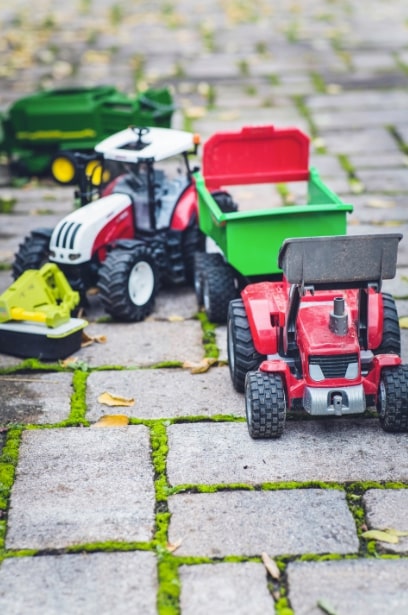Kids spend a lot of time playing with their toys. What you may not know however is that there are six stages to play. People use these to understand how children develop their skills. Every stage is marked by separate types of activities. For parents, they can use them to aid their kids in growing and learning. In this post, we are going to explain these stages. As a result, you will have an idea of what’s associated with every stage and how to support your children. You can then come to us if you want farm toys.
Unoccupied play
Firstly, we have the play that is right at the beginning of a kid’s life. Here, they start exploring the world surrounding them. This can be anything from witnessing a ball roll to touching their toes. Some will stare at themselves in a mirror. Such play allows children to familiarise themselves with their surroundings so they can find out how things work.
Solitary play
The next stage is where a kid plays by themselves. Normally, this is when they begin to develop their creativity and imagination. During solitary play, they will use their own creativity to create games. They will have some stories to tell as well. The important thing here is the child’s independence increases. They become more confident in their abilities. Farm toys work well with this stage of play.
Observer play
What happens here is that a kid observes other children playing. They may not join in themselves though. This stage is responsible for teaching children social concepts. They include conflict resolution, cooperation, and taking turns. Additionally, they will learn about game rules and how to interact with other kids. Examples include watching others play with toys and then joining in, and watching them slide or swing at the park.
Parallel play
Next we have when a child will play side-by-side with other kids. But, they don’t engage or interact with each other. What this sort of play does is aid children in developing their social skills. They will come to understand how to cooperate with others in a space without overwhelming them. It is an especially beneficial stage for shy children. These are ones who are more comfortable around other kids when they don’t interact directly with them. An example would be playing side-by-side but individual games at school without interacting with one another.
Associative play
Now children begin interacting and engaging with each other. They are not directly playing with one another though. This could mean they are using the same farm toys but on individual sides of the room. Others could be taking turns going on a slide or swing. Another thing associative play does is help in developing social skills and learning how to overcome conflicts.
Cooperative play
Finally, there is when children begin working together, actively engaging with one another. During this stage, they could be helping each other play with the same toys or playing educational games together. Cooperative play helps kids in developing social skills like cooperation and taking turns. This stage is very useful for children before they start school. They will know how to better get along with their peers.
Give our farm toys a go
At JS Hubbuck Ltd, we have multiple toys available for purchase. They are ideal for keeping the youngsters occupied and teaching them about farming. So, if you’re thinking of making any purchases, please let us know.

